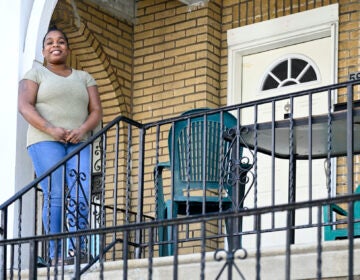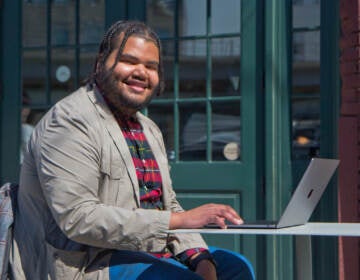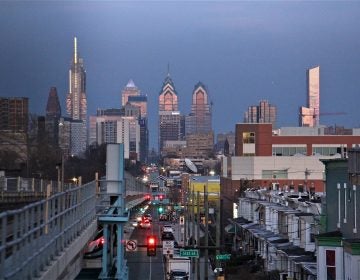From making rent to ‘found money’: Philly residents share their stimulus cash stories
The money — most adults will get $1,200, with an additional $500 per qualifying child — is meant to help Americans weather the economic downturn caused by the coronavirus.
Listen 5:17
Rebecca Foxman at her outpost Fox and Son Fancy Corn Dogs in Philadelphia’s Reading Terminal Market. (Courtesy of Rebecca Foxman)
Are you on the front lines of the coronavirus? Help us report on the pandemic.
People across the Philadelphia region are starting to get their federal stimulus checks this week.
The money — most adults will get $1,200, with an additional $500 per qualifying child — is meant to help Americans weather the economic downturn caused by the coronavirus outbreak.
“I would take care of your family and food issues first,” Philadelphia Mayor Jim Kenney said Tuesday. He went on to say those with “a little left over” should consider donating it to a fund set up to support nonprofits in the city.
When WHYY asked Philadephians on Facebook what they planned to spend their stimulus money on, hundreds of people wrote in — with priorities ranging from paying rent, to aiding family members, to donating to local charities.
‘Truly essential’
After almost a decade working nights as a supervisor at Wawa stores across Philadelphia, Ryan Lowther has seen a lot.
“A normal night shift before all this happened [was] pretty busy,” said Lowther, who currently works at a Wawa in Northeast Philadelphia. “One time these two people got into a fight…they actually started throwing fruit cups at each other. It didn’t make any sense.”
Lowther, 30, is considered an “essential” worker during the pandemic: He’s still working 10 p.m. to 7 a.m. five nights a week. But those shifts are a lot quieter than they used to be. Where his store used to see about 150 customers per night, Lowther said, they now get about 20. And the people who are coming in are on edge.
“Before all this went down, I would say that a vast majority of people were at least neutral [to me],” Lauther said. “But now people are becoming very rude…even when I am wearing a mask and gloves to touch their product, they give me a side look, a dirty look.”
Lowther said his full work schedule means he isn’t worried about making rent. But these long, empty nights have given him plenty of time to think about different career options.
By the time his $1,200 dollar stimulus payment landed in his bank account Wednesday morning, Lowther knew he would use it to help cover the cost of a training to be an Emergency Medical Technician.
“If I am going to be essential, I want to be truly essential,” Lowther said. “Once the stimulus check came in, I saw this was something I can actually pursue.”
‘Because I am blessed’
Carol Lynn Miller thrives on the social contact she gets from her job coaching teachers in the School District of Philadelphia on early childhood education. These last few weeks of isolation have been hard.
“I miss moving about around the city interacting with the children that are there and helping the teachers grow,” said Miller, who lives in West Philadelphia. “I miss it all.”
But Miller, 58, has been able to find a silver lining in the pandemic. She has more time now to focus on an idea she’s been kicking around for years: starting a nonprofit that would focus on helping children who are aging out of the foster care system.
Miller said her stimulus payment, once it arrives, will allow her to make that idea into reality.

“I want to use those funds to hire someone to file my paperwork and become official,” Miller said.
Miller recognizes she is one of the lucky ones — that her steady paycheck means she can contemplate spending on things other than food and bills.
That fact, she said, is all the more reason to start her nonprofit now.
“Because I am blessed, I want to be able to turn around and do something for someone else,” she said.
‘I am worried’
Three years ago, Rebecca Foxman took the leap of her life — she emptied her life savings and borrowed from her family to open Fox and Son Fancy Corn Dogs in Philadelphia’s Reading Terminal Market.
“It’s been incredible, said Foxman, 31. “We’ve done better than I ever imagined.”
That all changed for the Francisville resident last month. By mid-March, Foxman said, worrying about the health of her staff kept her up at night. Business was dropping. Foxman decided to lay off her nine staff members and close down Fox and Son entirely on March 17.
“I feel horrible for my staff,” Foxman said. “I’ve been texting and checking in with them, and sending them links to grants for food-service workers.”
Foxman applied for a business loan through the Paycheck Protection Program — a pot of federal money meant to keep small businesses afloat during the coronavirus shutdown — but she has not heard whether her application has been accepted yet. Small businesses across the Philadelphia region have complained of similar delays.
Personally, Foxman has been hurting for money, too. While she should be eligible for newly-expanded unemployment benefits, Pennsylvania’s special application form for self-employed people has not been made available yet.
Foxman plans to use her stimulus check to help her make rent.
“Otherwise, I will have to take out of the little bit of savings we have in the restaurant,” she said. “I am worried that if I take any more money from the restaurant when we are closed, we won’t be able to reopen.”
But Foxman may be waiting a while for her check to arrive. People like her who do not have direct deposit information on file with the IRS may have to wait weeks to receive a paper check — a delay possibly made longer by President Donald Trump’s decision to add his signature to the checks.
“I visited the IRS website and it keeps telling me they can’t look up my information at this time,” Foxman said. “So I actually don’t know when or how I will get that stimulus check.”
‘We don’t know how long this is going to take’
Nyiasha Johnson misses the airport.
The 40-year-old North Philadelphia resident spent the last three years working as an airport security guard, guiding lines and directing passengers.
“You get to meet different people every day, and vicariously live through them,” Johnson said. “I loved my job.”
News of the coronavirus first started trickling through conversations at the airport last December, Johnson said, “but it didn’t seem that serious.” That changed in March, when passenger numbers started falling, and those who did show up wore masks and gloves. Still, Johnson thought her job was safe. That changed when she was called into her manager’s office on March 18. She was laid off.

“It was unexpected and confusing,” Johnson said.
Johnson quickly applied, and was approved for, unemployment benefits. That’s allowed her to keep paying her rent and bills.
By Wednesday, she hadn’t yet received her stimulus check — but she knows exactly what she’ll do with it.
“I am going to save it,” Johnson said. “I am at the point right now where I feel I need to save up…because we don’t know how long this is going to take.”
Johnson’s frugality is rooted in her past. Before the security guard job she had been homeless, bouncing between friends and relatives.
Getting hired at the airport, she said, helped her pull her life together, and losing it so quickly reminded her of how quickly things can fall apart.
“I definitely don’t want that to ever happen again,” Johnson said.
‘We really didn’t need it’
For John Poynton, the coronavirus outbreak has meant a dramatically curtailed social life, and the cancellation of a long planned trip to Europe.
But, the retired school teacher living in Havertown said, financially it hasn’t made much of a difference.
“My state pension has been coming in,” said Poynton, 72. “And ironically [my wife and I] both got the stimulus checks this morning.”
Poynton plans to provide some financial support to his daughter, a professor at the University of Massachusetts whose research project has been shut down, and use some of the money to pay down this year’s income tax bill.

But he said he plans to give the rest of the money away: splitting it between the Patrician Society of Norristown, St. John’s Hospice of Philadelphia, and Mercy Hospice of Philadelphia.
“We really didn’t need it,” Poynton said. “It’s incumbent upon those of us who are doing well to make sure we support those who are in need.”
‘This is found money’
When Adam Bailey found out about the federal stimulus checks, he knew immediately he would donate his.
Bailey, a fourth grade teacher at Hunter Elementary school in North Philadelphia, is currently working from home.
“I’m a single, cis[gender] white male,” said Bailey, 28. “All these decisions and all these things that happen around me rarely affect me in a big way…So there was never a thought in my mind about what I would use this money for. To me personally, this is found money.”

Bailey is also a member of the Caucus of Working Educators: a faction of the Philadelphia Federation of Teachers Union that often advocates for social justice issues.
This week, the Caucus launched a campaign asking teachers to donate some or all of their stimulus checks to Philadelphians in need. Specifically, teachers are encouraged to donate to a fund that specifically supports the district’s ‘paraprofessionals:’ aides, assistants, and other low-paid classroom employees.
By Wednesday afternoon, about 70 people had made the pledge.
“Teachers and educators, we are generally altruistic,” Bailey said. “It’s not about the money for us. We are in it to help people.”
Bailey received his stimulus payment on Tuesday. Some of it went to an organization feeding people in his school’s neighborhood. Some went to help support the district’s school aides.
Bailey plans to donate the rest by the end of the week.
WHYY is your source for fact-based, in-depth journalism and information. As a nonprofit organization, we rely on financial support from readers like you. Please give today.





![CoronavirusPandemic_1024x512[1]](https://whyy.org/wp-content/uploads/2020/03/CoronavirusPandemic_1024x5121-300x150.jpg)



